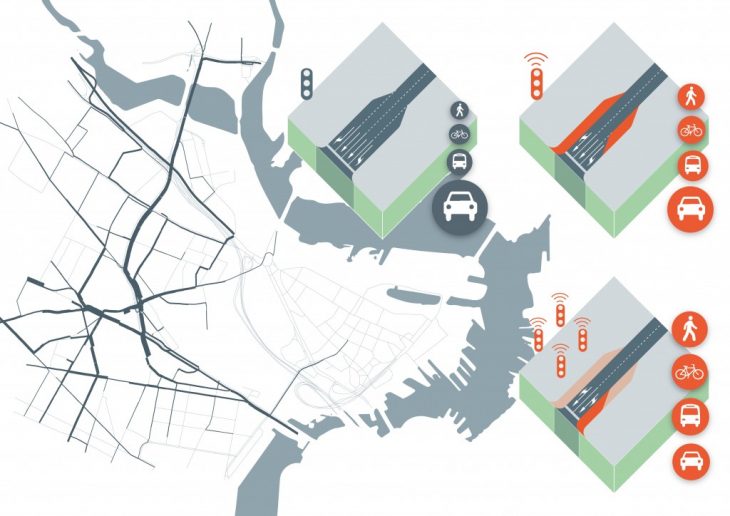IAAC- Master in City & Technology
Future Mobility Seminar
Lecturers:
Francesca Arcuri (Mobility in Chain) – arcuri@michain.com
Sebastiano Scacchetti (Mobility in Chain) – scacchetti@michain.com
Federico Parolotto (Mobility in Chain) – parolotto@michain.com
Coordinator:
Alex Mademochoritis (IAAC) – alex.mademochoritis@iaac.net
Course Description
Abstract:
This hands-on course, with a real-life project part in Barcelona, primarily investigates the close relationship and fields of opportunities between mobility at large and urban scale specifically. The focus will be placed on different tools, multi-scale methods as well as cultural theories that allow for a more differentiated approach to meet the needs of current and future mobility demand.
Using urban design and modeling tools and pairing them with demand evaluation methods, students will explore ways to generate user and context-specific insights and develop integrated solutions that merge transport/traffic and urban planning with the most recent trends in mobility innovation, all of this following a systemic design thinking.
Through the deployment of models, simulations, re-configurations, demand analyses, data and infrastructure mapping methods, the course will focus on the way mobility is represented and will explore the transformative effects of the introduction of new technologies in mobility and new transportation systems in the city of the Future. The students will develop a deep understanding of the mobility challenges faced by the cities of the future from a planning perspective on the one hand and the related socio-cultural implications on the other.

© Mobility in Chain
MIC teaching team
Mobility in Chain | MIC is a mobility and urban planning consultancy firm based in Milano, with branches in New York, Moscow. MIC works internationally for private and public entities in the field of mobility planning and urban design, with a strong focus on innovative technologies and sustainable solutions.
The teaching team is composed of Federico Parolotto, Francesca Arcuri and Sebastiano Scacchetti experts in the field of transportation planning, innovative mobility, urban data analysis and visualization and urban network modeling.
The teachers will be alternating during the course to provide the adequate insight for each different topic addressed during the lessons, while Alex Mademochoritis from IAAC will be GIS tutor and course coordinator.

© Mobility in Chain
Case Study
During the seminar, the students will have the opportunity to work on one of the most relevant infrastructures within the city of Barcelona. This element will become the base upon which to build new urban and transport scenarios, developing the suggestions the multidisciplinary teaching team will bring to the table. In particular, MIC experts will share with the students their vision about the future of mobility as well as the future of our cities as a whole. Sustainability through innovation is the key to liveable urban realities.
On these bases, students’ research and projects will be based on a deep reflection and analysis of the introduction of future mobility technologies as well as less obvious interpretation of transport innovation in Barcelona’s urban fabric. From intelligent mobility infrastructures to self-driving vehicles, from multimodal public & private transportation to self-sustainable shared transportation models and autonomous public transportation fleets. But also from radical space redistribution to new functional interpretations of the city environment.
The case study of la Rondas will allow the students, thanks to its variety of scales, identities and dynamics coexisting in the same ecosystem, to choose the analytic tools and the communication mode that would best suit their skills and learning goals, while promoting the rise of a structured and critical approach to transport and –more broadly – mobility planning.

© Mobility in Chain
Deliverables
Students will work in teams and submit their final project proposal, presenting a concept at the end of the course. The choice of format is free, the following formats are simple suggestions, not constraints!
- Hand drawn sketches
- Diagrams, visualizations and infographics
- Maps and plans
- GIS static mapping or web based map stories
- Dynamic/interactive visualizations
- Pics, Videos, interviews
- Cognitive mapping through interviews and visualization
- Neighborhood collaborative mapping
- Policies
- Wording
- Toolbox/ Catalogue with modular design components
Course set up
First Session: October 15th, 3:00pm – 7:00pm
Kick of Session (4hours)
- Who are we? General introductions of students and teaching staff.
- MIC and the new role of transport planning. Mobility analysis case studies and methodologies.
- Preliminary definition of tools, objectives, expected outputs and design workshop methodologies.
- Open questions, formation of teams.
Second Session: October 19th, 3:00pm – 8:00pm
Survey and observation tools for the Hackathon (2hours+”LasRondas” conference)
- Overview of the selected study area of “Las Rondas”.
- Planning for quantitative and qualitative observations activities to be performed on site.
- Definition of tools, objectives, expected outputs and design workshop methodologies.
- Anticipation of potential research objectives.
HACKATHON WEEKEND 20th and 21st of October
Third Session: October 22nd, 3:00pm – 5:00pm
User segmentation, Urban density and transportation capacity (2hours)
- Lesson learned: De-brief after the Las Rondas Hackathon
- Short presentation about parameters and methodologies to investigate urban and mobility patterns for all the different categories of road and public space users.
- Densities, infrastructure, landuse distribution and demand for mobility.
- Re-design the future of urban mobility in Barcelona’s Rondas. Brainstorming on research trajectories.
Fourth Session: October 26th, 3:00pm – 5:00pm
Multidisciplinarity & Interscalarity (2hours)
- Re-design the future of urban mobility in Barcelona’s Rondas
- Innovative mobility solutions and comprehensive mobility planning
- Further discussion and Definition of the research trajectories (!).
Fifth Session: October 29th, 3:00pm – 7:00pm
Workshop session – Project revisions and team working session (4hours)
- Re-design the future of urban mobility in Barcelona’s Rondas, discussion of early works of the students.
- Design review, project status presentations and work session to support on analysis.
Additional Skype workshop sessions ON DEMAND between 29/10 and 12/11
Sixth Session: November 6th, 3:00pm – 7:00pm
Workshop session – Final project revisions (4hours)
- Structured debate, revision and guidance session on the development of students’ projects.
- Finalization of storylines
Seventh Session: November 16th, 3:00pm – 7:00pm
Final presentation, 30 minutes per Team
Celebration!
